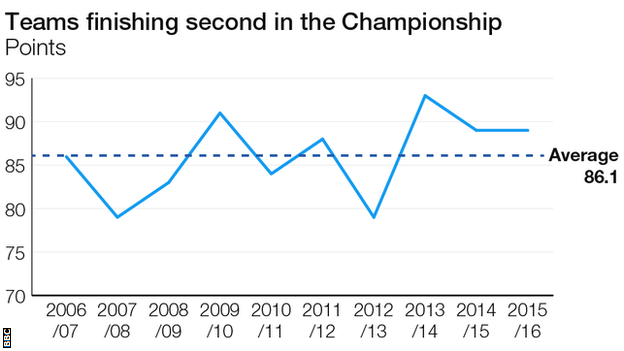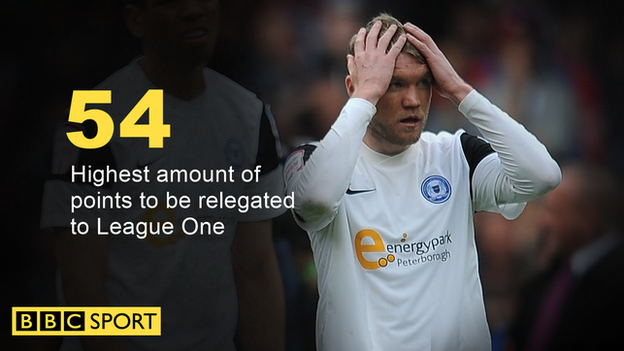EFL 2016-17: What does it take to win promotion from the Championship?
- Published

Burnley won the 2015-16 Championship title with 93 points
What exactly does it take to be promoted to the Premier League?
And what do you need to do to book a place in the play-offs? In fact, what is even required just to avoid relegation to League One?
Ahead of the new EFL campaign, which begins on Friday, BBC Sport has studied more than 30 years of statistics to try to answer all of these questions and more.
'You need 90 points to win promotion...'

Middlesbrough sealed automatic promotion to the Premier League in 2015-16 with 89 points
Last season, Aitor Karanka's Middlesbrough ended their seven-year absence from the top flight by taking second place in the Championship on goal difference, following a last-day draw against promotion rivals Brighton & Hove Albion.
Spare a thought for Chris Hughton's Seagulls, though. In addition to their final-day heartache, their 89-point haul would have won them the Championship title in three out of the five seasons leading up to 2015-16.
Boro's second-placed finish of 89 points was above average. In the last 10 seasons, teams have needed at least 86 points to seal automatic promotion to the Premier League.

In the last three seasons, teams finishing second in the Championship have had an above-average points total
Going for glory at Wembley

Hull City beat Sheffield Wednesday 1-0 in the 2016 Championship play-off final
Even if automatic promotion seems out of reach, a spot in the Championship play-offs may well be a more realistic proposition. So what do you need to do to give yourself a shot at going up at Wembley?
On average, teams have needed 73 points to reach the play-offs in the last 10 Championship seasons.

Leicester City qualified for the 2012-13 Championship play-offs with only 68 points
In 2012-13, Leicester City reached the play-offs with just 68 points - the lowest number a team has ever required to make the second-tier play-offs since the current four-team format was introduced in 1989-90.
Two seasons later, however, Wolves finished with a huge 78 points yet still managed to miss out on sixth place to Ipswich Town on goal difference.
How to avoid the drop

Peterborough United were relegated despite a record-high points total in 2012-13
Leicester's play-off-qualifying low points total in 2012-13 was not the only anomaly of that season. Poor old Peterborough United were relegated with 54 points, just 14 fewer than the Foxes.
That is the most of any team ever to be relegated from the second tier since three points for a win was introduced in the 1981-82 season - and five points higher than the 49 you need on average to remain in the division.
Just a season later, Paul Caddis' added-time goal against Bolton Wanderers helped Birmingham City stay up with 44 points, the lowest of any surviving team for 31 years.
An immediate return

Aston Villa will play in the second tier for the first time since 1987-88
Food for thought, Newcastle United, Norwich City and Aston Villa fans.
In the last 10 seasons, 16 of the 30 relegated clubs have finished in the top six the following campaign, with 10 of those winning promotion back to the Premier League at the first time of asking.
In seven of the last 10 campaigns, at least one team which had been relegated from the Premier League went straight back up.
Staying in the second tier

Burton Albion were promoted to the English second tier for the first time in their history in 2015-16
Burton Albion reached the English second tier for the first time in their history in May, but what do the stats say about how they might fare this season?
In the last 10 years, only Norwich City and Southampton have won back-to-back promotions from League One to the Premier League.
But, although that may have been a rare event as of late, successive promotions from the third to the first tier happened in five out of seven seasons between 1983-84 and 1989-90.

Since 2006-07, most sides who have been promoted from the third tier have stayed up in the following season
- Published2 August 2016

- Published2 May 2016

- Published14 January 2018
- Published7 June 2019
